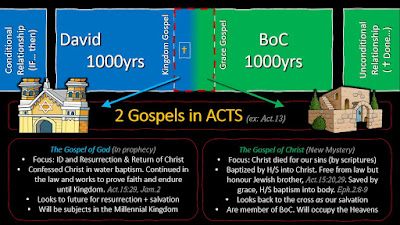Clearing up misunderstandings concerning, repentance vs. confession of sins, and remission of sins that are past, through the forbearance of God
STATEMENT:
You say, “we do not practice confession of sins because our salvation and fellowship with God are not dependent of OUR performance”, and further in the post you also say, “How many times can we be forgiven of "all unrighteousness?" Only once. In Christ, now and forever, we are forgiven of all sins ----past, present, and future!”
So, answer me these.
1- If Paul is the apostle of the Gentiles, why did he write, “…and then to the Gentiles, that they should REPENT and turn to God, and DO WORKS meet for repentance”, Acts 26:20. You should know that repent is also known as ‘confession of sins’.
2- Future sins? “Whom God hath set forth to be a propitiation through faith in his blood, to declare his righteousness for the remission of sins THAT ARE PAST, through the forbearance of God” Rom 3:25
RESPONSE:










